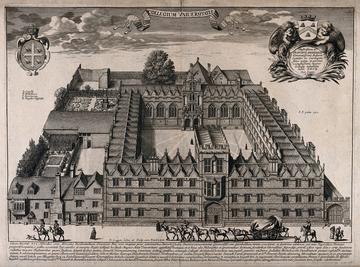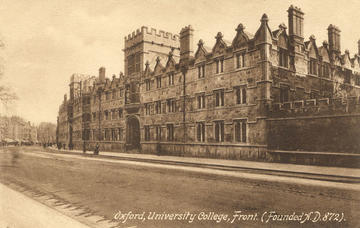A history of my college - Univ
University College is steeped in history, but it is by no means stuck in the past

Rufus Jones is a first year reading Ancient and Modern History at University College. When he is not pursuing his love of history, he enjoys playing Ultimate Frisbee.
Thanks to a fallacious document from the 14th-century, University College, Oxford has had one of the longest identity crises on record.
For much of its history, University College was believed to have been founded by King Alfred. Considering Alf was a learned man who placed great importance on scholarship, it does make sense that he would have founded a college (and it’s pretty cool to have been founded by a royal too!). So, for a good 600 years, no one questioned Univ’s origins.
Scholars began to scratch their heads about the whole thing in the 19th-century and as it turned out, the document alleging Univ’s foundation à la King Alfred was bogus and Univ was actually founded by a clergyman, William of Durham.[1] He set aside money in his will for the foundation of a college for roughly 10 to 12 theologians in Oxford – and he died in 1249. Despite the considerable gulf of time between a foundation in the 900s and one in the 1200s, though, Univ can still just about claim to be the oldest college.
For the sake of fairness, I will admit that two colleges dispute this; those being Balliol and Merton. What cannot be disputed is that each college has a different, but nonetheless legitimate, claim to the coveted spot of being the older sibling of every other Oxford college. University College had the financial bequest first, Balliol had the land first, and Merton had the statutes first. I will leave it up to the reader to decide which college they deem the oldest. It would be nothing short of treason as a University College student to say Balliol or Merton are the oldest colleges, though, so just know that if I told you University College was the oldest definitively, it would be because I am as biased as all hell.

I am going to now gloss over roughly 300 years of history. Nothing of particular note happens to Univ, apart from a bit of accommodation reshuffling, between the 1200s and the 1500s. You may gasp at this prospect; isn’t 300 years a long time to skip over? America isn’t even that old! Well, yes. It is a long time. It is all a matter of perspective, though. If you were eight-hundred years old, three-hundred years old would be your younger years, but by no means your entire life.
If we were to compare the life of a college to that of a person, Univ did not have the best start in life. Her childhood was a rather unfortunate affair, indeed, one of want and shortage, lacking both in scholars and funds. I am sure you now understand that is as much for your sake as for hers that I choose to gloss over these centuries of paucity.
As this article is primarily intended for historians, I hope that if I asked you to think of a momentous event of English history from the 1600s, you wouldn’t look at me like I had asked you to recite the periodic table backwards. “The English Civil War!” I hear you cry triumphantly from the other side of the screen. Yes, precisely! The Civil War broke out during the construction of Main Quad, which had started in 1634, and brought work to a standstill. Rather inconsiderate, if you ask me. I certainly don’t envy the freshers of the 1640s, as the ‘Main Quad’ they were met with on move in day was a garish, unfinished muddle of medieval hall and sandstone quadrangle. Thankfully, the conflict came to an end and the Main Quad was complete by 1676. Consider for a moment that the very quadrangle you see today was the same one seen by those scholars of the seventeenth-century. Quads at every college, not just Univ, in fact, hold that tangible connection not only to their past students, but the past eras of history. That is one of the many bewitching things about Oxford.
Radcliffe Quad came next. It was named after the man who endowed it to the college, a certain mister John Radcliffe, who in every way was the ideal alumnus: a wealthy bachelor with a soft spot for his old college. Its construction was seamless, more so than the previous attempt at a quadrangle anyway, and it was finished by 1719. Upon closer inspection, ‘quadrangle’ may seem too generous a term, as its walls are forced to adopt an asymmetrical stance due to the curvature of the High Street. Although geometry pedants may protest, Radcliffe Quad has happily remained Univ’s 2nd quadrangle for a good many years.
Many of Univ’s most lauded alumni hail from more recent times, such as Stephen Hawking, Bill Clinton, and Clement Attlee (who remained fond of Univ for the rest of his life, one such expression of this being the gifting of his papers to the college archives). I for one like to see this as a testament to the college’s commitment to remain a college not of an age, but for all time. As this article has shown, University College is steeped in history, but it is by no means stuck in the past, and students and tutors alike can attest to that. Although a focus on the past is of much benefit, to stay glued to it is to miss all that Univ has left to do. Now that truly would be a shame.
[1] If University College wasn’t the first college founded by a royal, which one was? That would be Oriel College, founded by Edward II in 1324.




